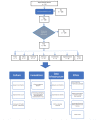An Analysis of the Learning Health System in Its First Decade in Practice: Scoping Review
- PMID: 32191214
- PMCID: PMC7118548
- DOI: 10.2196/17026
An Analysis of the Learning Health System in Its First Decade in Practice: Scoping Review
Abstract
Background: In the past decade, Lynn Etheredge presented a vision for the Learning Health System (LHS) as an opportunity for increasing the value of health care via rapid learning from data and immediate translation to practice and policy. An LHS is defined in the literature as a system that seeks to continuously generate and apply evidence, innovation, quality, and value in health care.
Objective: This review aimed to examine themes in the literature and rhetoric on the LHS in the past decade to understand efforts to realize the LHS in practice and to identify gaps and opportunities to continue to take the LHS forward.
Methods: We conducted a thematic analysis in 2018 to analyze progress and opportunities over time as compared with the initial Knowledge Gaps and Uncertainties proposed in 2007.
Results: We found that the literature on the LHS has increased over the past decade, with most articles focused on theory and implementation; articles have been increasingly concerned with policy.
Conclusions: There is a need for attention to understanding the ethical and social implications of the LHS and for exploring opportunities to ensure that these implications are salient in implementation, practice, and policy efforts.
Keywords: bioethics; health information exchange; knowledge management; learning health system; review.
©Jodyn E Platt, Minakshi Raj, Matthias Wienroth. Originally published in the Journal of Medical Internet Research (http://www.jmir.org), 19.03.2020.
Conflict of interest statement
Conflicts of Interest: None declared.
Figures




Similar articles
-
The Science of Learning Health Systems: Scoping Review of Empirical Research.JMIR Med Inform. 2022 Feb 23;10(2):e34907. doi: 10.2196/34907. JMIR Med Inform. 2022. PMID: 35195529 Free PMC article.
-
Exploring conceptual and theoretical frameworks for nurse practitioner education: a scoping review protocol.JBI Database System Rev Implement Rep. 2015 Oct;13(10):146-55. doi: 10.11124/jbisrir-2015-2150. JBI Database System Rev Implement Rep. 2015. PMID: 26571290
-
Australia in 2030: what is our path to health for all?Med J Aust. 2021 May;214 Suppl 8:S5-S40. doi: 10.5694/mja2.51020. Med J Aust. 2021. PMID: 33934362
-
Ethics of Procuring and Using Organs or Tissue from Infants and Newborns for Transplantation, Research, or Commercial Purposes: Protocol for a Bioethics Scoping Review.Wellcome Open Res. 2024 Dec 5;9:717. doi: 10.12688/wellcomeopenres.23235.1. eCollection 2024. Wellcome Open Res. 2024. PMID: 39839977 Free PMC article.
-
Depressing time: Waiting, melancholia, and the psychoanalytic practice of care.In: Kirtsoglou E, Simpson B, editors. The Time of Anthropology: Studies of Contemporary Chronopolitics. Abingdon: Routledge; 2020. Chapter 5. In: Kirtsoglou E, Simpson B, editors. The Time of Anthropology: Studies of Contemporary Chronopolitics. Abingdon: Routledge; 2020. Chapter 5. PMID: 36137063 Free Books & Documents. Review.
Cited by
-
Leveraging National Claims and Hospital Big Data: Cohort Study on a Statin-Drug Interaction Use Case.JMIR Med Inform. 2021 Dec 13;9(12):e29286. doi: 10.2196/29286. JMIR Med Inform. 2021. PMID: 34898457 Free PMC article.
-
Leveraging data to support health equity in an integrated delivery and finance system.Learn Health Syst. 2024 Apr 15;8(Suppl 1):e10423. doi: 10.1002/lrh2.10423. eCollection 2024 Jun. Learn Health Syst. 2024. PMID: 38883869 Free PMC article.
-
The Science of Learning Health Systems: Scoping Review of Empirical Research.JMIR Med Inform. 2022 Feb 23;10(2):e34907. doi: 10.2196/34907. JMIR Med Inform. 2022. PMID: 35195529 Free PMC article.
-
Baseline Quality Improvement Capacity of 33 Endocrinology Centers Participating in the T1D Exchange Quality Improvement Collaborative.Clin Diabetes. 2022 Winter;41(1):35-44. doi: 10.2337/cd22-0071. Epub 2022 Oct 19. Clin Diabetes. 2022. PMID: 36714248 Free PMC article.
-
Implementation model for a national learning health system (IMPLEMENT-National LHS): a concept analysis and systematic review protocol.BMJ Open. 2023 Oct 31;13(10):e073767. doi: 10.1136/bmjopen-2023-073767. BMJ Open. 2023. PMID: 37907296 Free PMC article.
References
-
- Olsen L, Aisner D, McGinnis JM, Roundtable on Evidence-Based Medicine. Institute of Medicine . The Learning Healthcare System: Workshop Summary. Washington, DC: National Academies Press; 2007. - PubMed
-
- Swan M. Emerging patient-driven health care models: an examination of health social networks, consumer personalized medicine and quantified self-tracking. Int J Environ Res Public Health. 2009 Feb;6(2):492–525. doi: 10.3390/ijerph6020492. http://www.mdpi.com/resolver?pii=ijerph6020492 - DOI - PMC - PubMed
Publication types
MeSH terms
LinkOut - more resources
Full Text Sources
Medical
Miscellaneous

